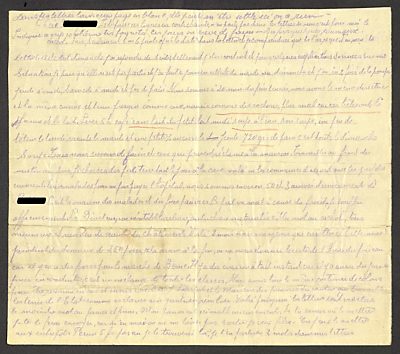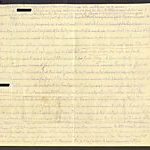Letter marked as «contraband», written by a detainee at Bellechasse
 «Contraband letter» of an administrative detained person at Bellechasse, 1927, p. 1
«Contraband letter» of an administrative detained person at Bellechasse, 1927, p. 1 Up until well into the 1950s, the house rules at the establishment stipulated that a detainee was permitted to send only one letter per month – on condition that his conduct «did not give cause for any complaint» – and to receive a single package. The rules also state that «letters containing any remarks or observations concerning the institution, its employees, or it rules and regulations, will be neither sent nor delivered.» Each letter was therefore reviewed by the directors of the facility, and those that were held to be contrary to the rules were confiscated and preserved in the individual case file of the detainee concerned.
The detainees found these conditions extremely restrictive and used various strategies to get around them. One of these was the development of a system of «contraband correspondence», that is, for giving letters to visitors or staff members for outside delivery. Often the letters were written on any paper the detainees could find (wrapping from chocolate bars, craft paper, etc.). Such «contraband» letters are easily recognisable in the detainee case files in the Bellechasse archives, since they are folded as small as possible, almost certainly so that they could be hidden in the lining of clothing.
Research questions
The letters found in the case files are highly valuable, in that they constitute a unique source of information on the way the detainees viewed the conditions under which they were being held and on the strategies they developed for staying in contact with their friends and family on the outside.
The «contraband» letters that were written with the intent of escaping the control of the facility directors also constitute evidence of what the detainees wished to complain about, considered unacceptable, or knew to be prohibited.
The author of this letter, for example, which was written in 1927 and is addressed to his daughter, complains about the shortage of food and clothing, and about the harsh working conditions that the detainees had to submit to. He also asks his daughter to hide food for him in the next packages she sends, and tells her of the punishment he is risking: «Leonie, I am sending you these lines as contraband; don’t mention this in your letters or I’ll be put in solitary. Just make five or six dots after the date in your letter. That way I’ll know you got this.»
Methodology
This «contraband» letter, which was found in an individual detainee case file from Bellechasse, was probably intercepted by the prison directors and was preserved in the case file of the author. The addressee certainly never received it.
In isolation, this source reflects an individual point of view on the conditions of detention. Taken together with other letters of the same nature, however, it is possible to reconstruct the living conditions of the detainees held inside the institution and their strategies for resistance. In addition, read in conjunction with the other documents in a detainee case file (including the detention orders and the correspondence exchanged by the authorities concerning the detainee), such letters also provide evidence of the authors’ views on their own situation and on the decisions made about them by the authorities – views that were rarely upheld in administrative detention proceedings.
These letters are nonetheless not sufficient for providing a comprehensive picture of what detainees at Bellechasse experienced, since many of the case files do not contain any letters of this kind.
L. Odier, A.-F. Praz/Translation
source
«Contraband letter» of an administrative detained person at Bellechasse, 1927.
Signature: Staatsarchiv Freiburg (StAF/AEF): Bestand Bellechasse, Dossier A 10647.
Remarks
In order to protect the identity of the individual concerned and of his friends and family, certain particulars have been redacted for publication.
Staatsarchiv Freiburg (StAF): Bestand Bellechasse, Dossier A 10647
 previous source
previous source
 next source
next source


